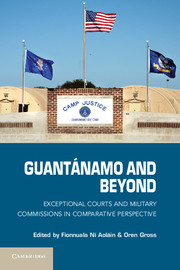Book contents
- Frontmatter
- Contents
- Contributors
- Acknowledgments
- Introduction: Guantánamo and Beyond
- Part I Military Commissions and Exceptional Courts in the United States
- 1 The Development of an Exceptional Court
- 2 Military Commissions in Historical Perspective
- 3 Contemporary Law of War and Military Commissions
- 4 Military Commissions and the Paradigm of Prevention
- 5 Prevention, Detention, and Extraordinariness
- 6 In Defense of Federal Criminal Courts for Terrorism Cases in the United States
- 7 Exceptional Courts and the Structure of American Military Justice
- 8 Exceptional Courts in Counterterrorism
- Part II Exceptional Courts and Military Commissions Elsewhere
- Part III International Law, Exceptional Courts, and Military Commissions
- Index
8 - Exceptional Courts in Counterterrorism
Lessons from the Foreign Intelligence Surveillance Act (FISA)
Published online by Cambridge University Press: 05 June 2014
- Frontmatter
- Contents
- Contributors
- Acknowledgments
- Introduction: Guantánamo and Beyond
- Part I Military Commissions and Exceptional Courts in the United States
- 1 The Development of an Exceptional Court
- 2 Military Commissions in Historical Perspective
- 3 Contemporary Law of War and Military Commissions
- 4 Military Commissions and the Paradigm of Prevention
- 5 Prevention, Detention, and Extraordinariness
- 6 In Defense of Federal Criminal Courts for Terrorism Cases in the United States
- 7 Exceptional Courts and the Structure of American Military Justice
- 8 Exceptional Courts in Counterterrorism
- Part II Exceptional Courts and Military Commissions Elsewhere
- Part III International Law, Exceptional Courts, and Military Commissions
- Index
Summary
THE FOREIGN INTELLIGENCE SURVEILLANCE COURT (FISC) IS an exceptional court created by Congress to respond to a unique set of challenges related to foreign intelligence. On the one hand, U.S. presidents had on occasion authorized electronic surveillance and physical searches in pursuit of foreign intelligence without any prior judicial authorization, raising concerns that executive officials were violating the free expression and privacy rights of affected persons. On the other hand, many experts agreed that the need for speed and secrecy in collecting foreign intelligence in the face of threats of terrorism and espionage rendered traditional judicial warrant procedures ill-suited for foreign-intelligence surveillance. The FISC responded effectively to these challenges, but this exceptional court has also generated new problems. Because the factual predicate for gaining FISC approval to conduct surveillance or search is less demanding than what is required in traditional criminal cases, there has developed a considerable spillover effect, where criminal investigators and prosecutors rely on the exceptional FISC procedures to gather evidence for later use in criminal prosecutions. As a result, Fourth Amendment protections for the accused may be threatened by use of the exceptional procedures. At the same time, recent revisions to the FISC authorize the exceptional court to grant blanket approval to wholesale collection of foreign intelligence through issuance of directives to telecommunications companies and Internet service providers. In this new role, the authorization for programmatic surveillance omits the case-by-case review of applications for surveillance and converts the FISC into an administrative clerk for executive officials.
- Type
- Chapter
- Information
- Guantánamo and BeyondExceptional Courts and Military Commissions in Comparative Perspective, pp. 181 - 198Publisher: Cambridge University PressPrint publication year: 2013

